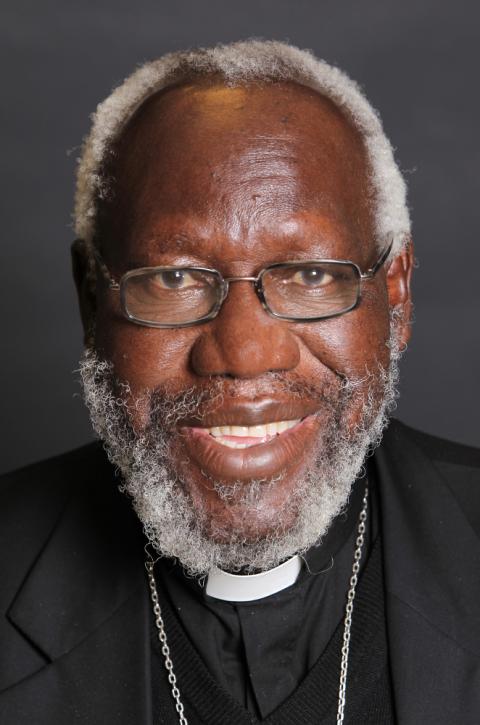
In May Bishop Paride Taban, retired bishop of Torit, South Sudan, will receive the Freedom of Worship Award, presented by the Roosevelt Foundation in Middelburg, Netherlands. Taban is pictured in a 2010 photo in Washington. (CNS/Bob Roller)
A bishop in South Sudan has won an award that recognizes the peace village he founded as the visible embodiment of his peacemaking efforts.
In May, Bishop Paride Taban, retired bishop of Torit, will receive the Freedom of Worship Award, one of the Four Freedoms Awards presented every other year by the Roosevelt Foundation in Middelburg, Netherlands.
Taban is "a rare figure in a fractured country, someone who has excellent contact with leaders on all sides and is not afraid to call them to account," the Dutch peacebuilding organization PAX said in a Feb. 6 statement.
The 82-year-old bishop set up the Kuron peace village in 2005 in Eastern Equatoria, a thinly populated area in the southeast of South Sudan. The village is a three-day journey by road from the capital, Juba.
Since the 1960s, Taban "has worked as a peacemaker, drawing on seemingly bottomless reserves of patience, optimism and strategic insight," the Roosevelt Foundation said in a Feb. 6 statement announcing the award.
The foundation said the award was made to Taban "for his lifelong and selfless dedication to the cause of bringing freedom and peace to the people of South Sudan."
The bishop's "great wisdom and deep respect for different religions and cultures has enabled him to forge emotional bonds between otherwise battling groups," it said.
He "continues to call for an end to the human suffering and for a peaceful solution of the conflict in South Sudan in local, national and international forums," the foundation said, noting that "through his life's work he is keeping the flame of hope for peace alive, not only by preaching the word of God but by living it."
South Sudan became independent from Sudan in 2011. Civil war in the northeast African country erupted in late 2013 after President Salva Kiir, an ethnic Dinka, accused his former deputy, Riek Machar, an ethnic Nuer, of fomenting a coup. The conflict has put 1.5 million people on the brink of starvation. Tens of thousands of people have died, more than 2 million have fled to neighboring countries and almost 2 million more are internally displaced.
"Much of the population has fled due to the fighting, agricultural land remains fallow, hunger and lawlessness prevail and scarce resources are manipulated," the PAX statement said.
In the peace village set up by Taban, "young people and community leaders learn how to live peacefully together and acquire skills in how to resolve conflict," it said, noting that "they bring these skills with them when they return to their communities."
Carpentry lessons, including how to make chairs and tables, are also offered in the village, and arithmetic, reading and writing are taught.
Advertisement
In 2016, Taban told the Jieng Council of Elders in Juba that, for lasting peace to be achieved, South Sudanese needed to learn 20 words and eight phrases, according to Vatican Radio.
"The words are love, joy, peace, patience, compassion, sympathy, kindness, truthfulness, gentleness, self-control, humility, poverty, forgiveness, mercy, friendship, trust, unity, purity, faith and hope. These are 20, and the eight phrases are: I love you, I miss you, thank you, I forgive, we forget, together, I am wrong, I am sorry," he said.







